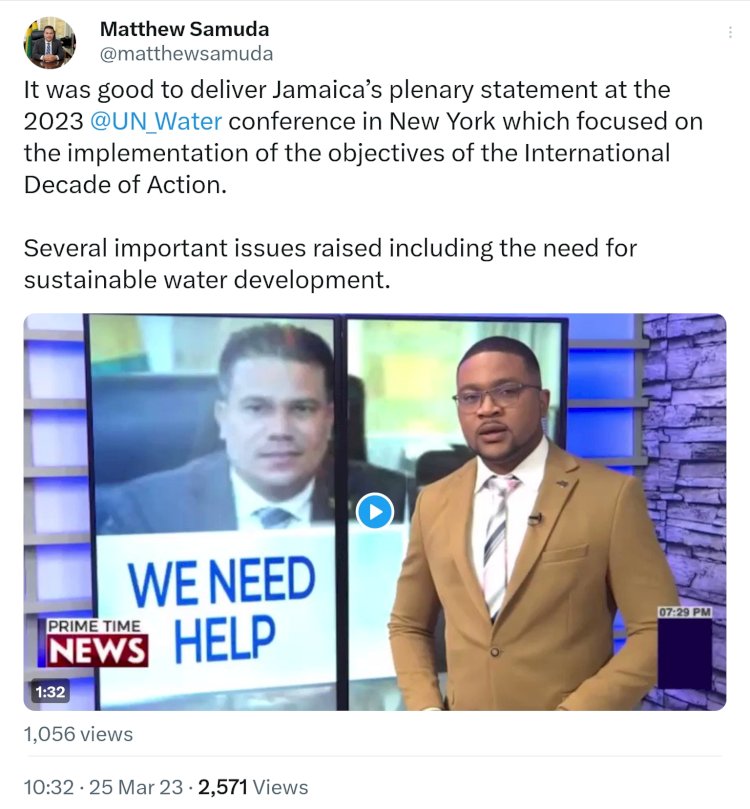The floating solar platform con
PM Andrew Holness claimed that the solar project was "...another strategic and synergetic nation-building decision that generations to come will benefit from.” No, it is a decision that the foreign investors and their generations will benefit from.

It is said that corruption thrives in darkness, well in Jamaica it flourishes in the open. Exploitation is it's bedfellow, and the biggest exploiters in history are the Europeans. However, the likes of the UK are depicted as less corrupt when their wealth is still generated by nefarious activities. The previous report highlighted the incredible viability of solar, whereas this report outlines an example of how the exploiters are aided by an unscrupulous and treacherous government.
The floating solar platform
In September 2022, PM Holness made an announcement regarding a US$62.5m foreign investment in a 45MW floating solar platform on the Mona Reservoir. He said the following: “One of the largest costs to the NWC [National Water Commission], is its energy cost. The savings will be significant, and it will strengthen the NWC.... What you’re seeing today is another strategic and synergetic nation-building decision that generations to come will benefit from.” The following month, Minister Samuda, who is in charge of the commodity, pointed out their sagacity in an address to parliament. For instance, the NWC will receive payments of US$25k for leasing out the surface area for the facility, and other benefits included decreased evaporation losses from the reservoir’s surface, along with reduced need to treat algae buildup.
Fast forward to March 2023 and the United Nations conference on water. Minister Samuda who is co-chair of the Group of Friends on Children and the Sustainable Development Goals, spoke about the human rights of children to access water. He also sang from the PM's hymn sheet, quote: "The high cost of electricity has significantly impacted Jamaica ability to distribute water to all." He went on to boast that Jamaica is reducing it's energy consumption in the distribution process, and the aforementioned floating solar platform was highlighted as an example.
However, when one examines the PM's "synergetic nation-building decision," it points to a return on investment of less than 4 years for the investors.
My Analysis
The investors will be selling electricity to the local supplier Jamaica Public Service Company (JPSCo), and the rates received should be similar to those paid to Wigton Windfarm. I think that is a fair assumption. Wigton generates 62.7MW, and in financial year 2021-22 had sales of just over JM$2b (US$13.3m). According to the NWC, Mona will generate 35MW (56% output of Wigton), so expected sales to JPS should be in the region of JM$1b.
The solar facility will also generate 10MW to power some water facilities. In his parliamentary address, Samuda said “...the NWC should, conservatively, see a reduction in the… overall energy cost KWh of 30% of the current rate..." Also, "The projected savings, conservatively, is approximately JM$1b a year" which suggests that the annual bill for these facilities is over $3b. Therefore, the investors could be paid over JM$2b by the NWC i.e. the people. Something is wrong. Foreign owned JPSCo will pay around JM$1b for 35MW, but NWC will pay JM$2b for 10MW.
So the potential annual earnings are over JM$3b (US$20m), on a US$62.5m investment. If this is true, then explanations are needed from many quarters. To handover a return on investment of around 3 years to the private sector is treasonous. Over a year ago I asked for an investigation by the Major Organised Crime and Anti-Corruption Agency MOCA but nothing has been done.
State Investment Option
According to minister Samuda, the NWC has a network of more than 730 facilities with average monthly costs of $650m, which suggests an annual bill around US$52m. He also repeated that energy is one of the most important pillars of water production and distribution.
One must therefore ask minister Samuda why our facilities are still on the grid at an annual cost of US$52m when almost everyday somewhere on the island suffers from water issues because of JPSCo. The shadow minister of energy, Philip Paulwell said solar pays for itself in 3 years, and he should know because he came off the grid in 2012 and back then he commented on a 5 year payback period. So the parliamentarians have known about the economic viability of renewables for over a decade but have chosen to leave all state owned infrastructure on the grid at an annual cost of around US$150m. State investment would cost around US$500m and improve a major water problem, whilst generating savings over US$150m per annum, monies that could be invested to upgrade the water system and improve educational funding. In 2022, the minister of education reported that 50% of our schools have water issues. That is putting it nicely, many don't have running water so one must wonder how girls cope. Period poverty must be rife but the parliamentarians choose to exacerbate matters with their nefarious water policy. They are currently spending US$50m of the people's money on a luxurious new parliament building, so we know where their priorities lie.
This incredibly prudent investment can be immediately financed from the US$1.7b loan facility made available by the IMF, because US$764m is for green energy projects. And there is over US$4.5b sitting in the national reserves. Hoarding the people's money in the reserves when global inflation is at an all time high is further indication of gross financial mismanagement.
Exploitation
I disagree with the PM. What we're seeing are policies to make foreign investors richer at the people's considerable expense. Handing over returns on investment of under 4 years is monumental financial negligence bordering on criminality. But Minister of Energy Daryl Vaz joined the party, contending that the project is directly in tandem with the Jamaica National Energy Policy 2030, which stipulates that government ministries and agencies serve as models and leaders in energy conservation and environmental stewardship. However, our ministries and agencies are leaders at producing gold mines for investors. In Mar 2022, a Canadian company signed a deal with the Ministry of Education for a schools solar pilot project.
The goal should be take water distribution, all educational institutions and other state owned infrastructure off the grid. The goal should be to stop the abuse of the human rights of children and their access to water, not to brag about having the first floating platform in the region. This is yet another example of why we don't have money for roads and bridges, markets and transport centres, proper solid waste management etc. This policy is clearly immoral, foreign involvement in renewables should be limited to loans and not translate into ownership. Foreign investors do not make solar panels or batteries, and they do not bring critical expertise to the install or maintain facilities. One only has to have money, it is that simple. The foreign investors borrowed the money, so why couldn't we?























